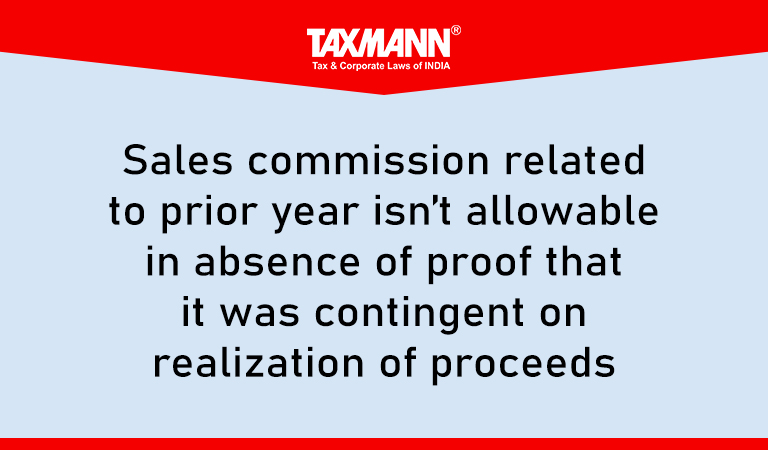Sales commission related to prior year isn’t allowable in absence of proof that it was contingent on realization of proceeds
- Blog|News|Income Tax|
- 2 Min Read
- By Taxmann
- |
- Last Updated on 19 February, 2022

Case Details: Meena Circuits (P.) Ltd. v. ACIT - [2022] 135 taxmann.com 54 (Ahmedabad - Trib.)
Judiciary and Counsel Details
-
- P.M. Jagtap, Vice-President and Mahavir Prasad, Judicial Member
- Smt. Arti Shah, AR for the Appellant.
- Smt. Jyoti Shah, Sr. DR for the Respondent.
Facts of the Case
Assessee-company was engaged in manufacturing printed circuit boards, and it had filed the return of income declaring total income nil. During the assessment, Assessing Officer (AO) noticed that assessee had claimed sales commission expenditures related to the earlier year.
The assessee was called upon to explain why these expenses should not be disallowed. The assessee submitted that commission to the agent was to be paid after realization of sales effected through them as per its policy. Thus, agents raise debit notes in respect of commission due to them after sale is realized, and thus such commission is paid and claimed as an expense in books of account.
However, the AO rejected the assessee’s contention and denied the benefit of deduction. On appeal, the CIT(A) upheld the order of AO. Aggrieved-assessee filed the instant appeal before the Tribunal.
ITAT Held
The Ahmedabad Tribunal held that the assessee had not been able to produce any documentary evidence either in a written agreement with the concerned agents or even in the form of any correspondence to establish that the commission was payable to them only on realization of corresponding sale proceeds.
Assessee was following the mercantile system of accounting. Thus, when the corresponding sales were duly accounted for in the earlier year and recognized as income, the commission payable in respect of the said sales at an agreed rate should have been claimed as deduction by the assessee in that year itself going by matching principle.
There was also nothing brought on record to establish that the liability for the said commission pertaining to the earlier year had arisen and crystallized in the year under consideration.
Disclaimer: The content/information published on the website is only for general information of the user and shall not be construed as legal advice. While the Taxmann has exercised reasonable efforts to ensure the veracity of information/content published, Taxmann shall be under no liability in any manner whatsoever for incorrect information, if any.

Taxmann Publications has a dedicated in-house Research & Editorial Team. This team consists of a team of Chartered Accountants, Company Secretaries, and Lawyers. This team works under the guidance and supervision of editor-in-chief Mr Rakesh Bhargava.
The Research and Editorial Team is responsible for developing reliable and accurate content for the readers. The team follows the six-sigma approach to achieve the benchmark of zero error in its publications and research platforms. The team ensures that the following publication guidelines are thoroughly followed while developing the content:
- The statutory material is obtained only from the authorized and reliable sources
- All the latest developments in the judicial and legislative fields are covered
- Prepare the analytical write-ups on current, controversial, and important issues to help the readers to understand the concept and its implications
- Every content published by Taxmann is complete, accurate and lucid
- All evidence-based statements are supported with proper reference to Section, Circular No., Notification No. or citations
- The golden rules of grammar, style and consistency are thoroughly followed
- Font and size that’s easy to read and remain consistent across all imprint and digital publications are applied



 CA | CS | CMA
CA | CS | CMA
